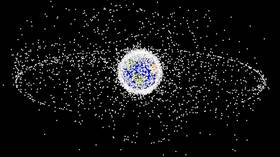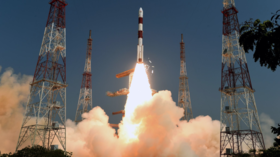NASA attacks India’s ‘terrible’ space weapon test, but US is creator of much more space debris
Published time: 2 Apr, 2019 18:07

NASA chief Jim Bridenstine said India’s recent anti-satellite missile test was a “terrible thing” because it has created dangerous space debris – despite the US being one of the major orbital litterers.
Creating debris in orbit is a “terrible, terrible thing,” Bridenstine said at a live-streamed town hall meeting. India’s test in late March of an anti-satellite weapon created 400 of such floating items, of which 60 are large enough for NASA to track, and 24 are flying above the highest points of the International Space Station’s orbit.
“That kind of activity is not compatible with the future of human spaceflight,”Bridenstine chided, saying India’s just-dumped space junk has increased the risk to the ISS by 44 percent.
ALSO ON RT.COMPentagon warns India against 'messy' tests in space, despite doing similar one in 2008
But the latest 60 trackable bits represent a tiny number compared to the total of 21,000 pieces larger than 10cm that NASA is already watching. A third of those were created in previous anti-satellite weapons tests by Russia, China and the US itself.
“It is indeed hypocritical for the US to complain since the Pentagon has created more space debris than any other nation on the planet,” says Bruce K. Gagnon, coordinator of the Global Network Against Weapons & Nuclear Power in Space.
Despite Bridenstine’s condemnation and the Pentagon’s earlier call to “not make a mess” in space, there won’t be any real consequences for India, Gagnon believes, because the US needs a space-warfare-capable India to corner China.
In fact, the US appears to actually be “encouraging India to militarize and weaponize space to help Washington encircle China – knowing that India and China have long had tensions,” he said.
The debris created by the Indian test will have a much less lasting impact on orbital safety than the ones the other space powers have left behind, says Brahma Chellaney, Professor of Strategic Studies at the Center for Policy Research in New Delhi.
“The debris from the Indian test, because it is in low orbit, will burn and fall back onto the Earth in the coming months, if not weeks. But the debris from the US and Chinese actions will persist for many years,” Chellaney told RT.
He also dismissed the notion that India’s arrival on the space weapons scene will spark a new arms race – because one is already underway and India is simply striving to keep up.
On the other hand, George W.S. Abbey, a former director of the Johnson Space Center (JSC) and Fellow in Space Policy at the Baker Institute of Rice University, has backed the NASA chief’s security concerns, saying it’s important to keep space “as clean as possible and not create more debris no matter what your country is, particularly when you have a manned spacecraft in orbit around the Earth.”
Indian Prime Minister Narendra Modi announced his country conducted its anti-satellite weapons test on March 28, shooting down its own low-orbit satellite with a ground-launched missile. At the time, US Air Force Space Command said the debris were no danger to the ISS.
India has become the fourth country to successfully test an anti-satellite weapon, after China, Russia and the US.


0 Comments:
Post a Comment
Subscribe to Post Comments [Atom]
<< Home